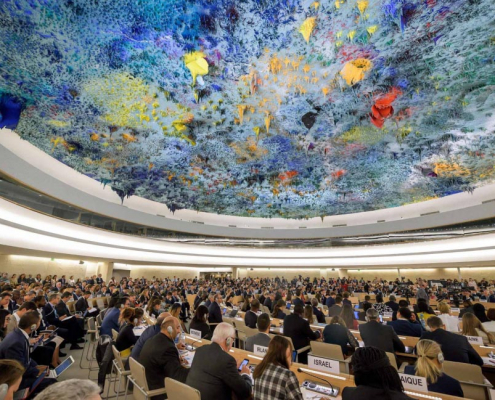
The human rights treaty bodies are committees of independent experts that monitor implementation of the core international human rights treaties. Each State party to a treaty has an obligation to take steps to ensure that everyone in the State can enjoy the rights set out in the treaty.
Currently, there are nine human rights international treaties, and one optional protocol, from which 10 treaty bodies have been established. The treaty bodies are composed of independent experts of recognized competence in human rights, who are nominated and elected for fixed renewable terms of four years by State parties.
Charter-based Bodies
Charter bodies include the former Commission on Human Rights, the Human Rights Council , and Special Procedures. The Human Rights Council, which replaced the Commission on Human Rights, held its first meeting on 19 June 2006. This intergovernmental body, which meets in Geneva 10 weeks a year, is composed of 47 elected United Nations Member States who serve for an initial period of 3 years, and cannot be elected for more than two consecutive terms. The Human Rights Council is a forum empowered to prevent abuses, inequity and discrimination, protect the most vulnerable, and expose perpetrators.
The Human Rights Council is a separate entity from OHCHR. This distinction originates from the separate mandates they were given by the General Assembly. Nevertheless, OHCHR provides substantive support for the meetings of the Human Rights Council, and follow-up to the Council’s deliberations.
Special Procedures is the general name given to the mechanisms established by the Commission on Human Rights and assumed by the Human Rights Council to address either specific country situations or thematic issues in all parts of the world. Special Procedures are either an individual -a special rapporteur or independent expert-or a working group. They are prominent, independent experts working on a voluntary basis, appointed by the Human Rights Council.
Special Procedures’ mandates usually call on mandate-holders to examine, monitor, advise and publicly report on human rights situations in specific countries or territories, known as country mandates, or on human rights issues of particular concern worldwide, known as thematic mandates. All report to the Human Rights Council on their findings and recommendations, and many also report to the General Assembly. They are sometimes the only mechanism that will alert the international community to certain human rights issues, as they can address situations in all parts of the world without the requirement for countries to have had ratified a human rights instrument.
As of 1 August 2017, there are 44 thematic mandates and 12 country mandates.
OHCHR supports the work of rapporteurs, independent experts and working groups through its Special Procedures Branch (SPB) which services all but one of the thematic mandates and provides centralised support to the Special Procedures as a system. The Field Operations and Technical Cooperation Division (FOTCD) supports the work of country-mandates.
See Also
- Human Rights Council
- Universal Periodic Review
- Commission on Human Rights (replaced by the Human Rights Council)
- Special Procedures of the Human Rights Council
- Human Rights Council Complaint Procedure
Treaty-based Bodies
There are nine core international human rights treaties, the most recent one — on enforced disappearance — entered into force on 23 December 2010. Since the adoption of the Universal Declaration of Human Rights in 1948, all UN Member States have ratified at least one core international human rights treaty, and 80 percent have ratified four or more.
There are currently ten human rights treaty bodies, which are committees of independent experts. Nine of these treaty bodies monitor implementation of the core international human rights treaties while the tenth treaty body, the Subcommittee on Prevention of Torture, established under the Optional Protocol to the Convention against Torture, monitors places of detention in States parties to the Optional Protocol.
The treaty bodies are created in accordance with the provisions of the treaty that they monitor. OHCHR supports the work of treaty bodies and assists them in harmonizing their working methods and reporting requirements through their secretariats.
There are other United Nations bodies and entities involved in the promotion and protection of human rights
There are ten human rights treaty bodies that monitor implementation of the core international human rights treaties:
- Committee on the Elimination of Racial Discrimination (CERD)
- Committee on Economic, Social and Cultural Rights (CESCR)
- Human Rights Committee (CCPR)
- Committee on the Elimination of Discrimination against Women (CEDAW)
- Committee against Torture (CAT)
- Committee on the Rights of the Child (CRC)
- Committee on Migrant Workers (CMW)
- Subcommittee on Prevention of Torture (SPT)
- Committee on the Rights of Persons with Disabilities (CRPD)
- Committee on Enforced Disappearances (CED)